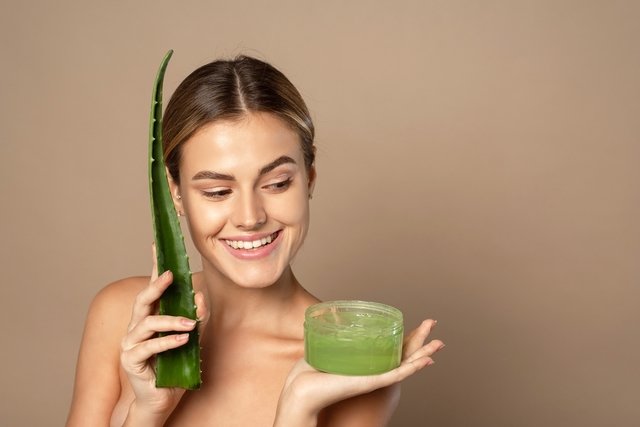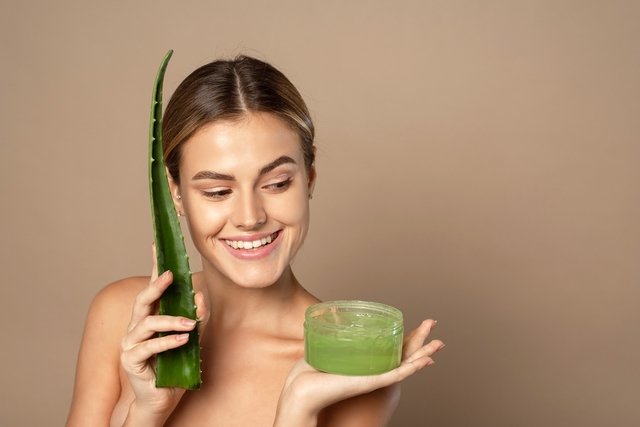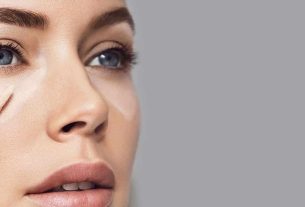The main benefits of aloe vera on the face are promoting skin hydration, preventing the appearance of wrinkles and reducing inflammation in the skin, and can be used to combat acne. These benefits are due to the fact that aloe vera is rich in vitamins and minerals, guaranteeing anti-inflammatory, antiseptic, moisturizing and healing properties.
Despite the benefits of using aloe vera, more scientific studies are still needed to confirm the effects of this plant on the skin, as well as the recommended amount, as the plant in nature may contain different concentrations of substances. Therefore, it is recommended that cosmetics containing aloe vera are used in their composition, as this makes it possible to control the concentration of the substances and guarantee the benefits of the plant. See more about the use of aloe vera.
Therefore, before starting to use aloe vera on your face, it is important to consult your dermatologist so that they can give you guidance on its use and how to use it, preventing complications such as itching, dryness and a burning sensation on the face.

Main benefits
The main possible benefits of aloe vera for the face are:
- Promotes skin hydration;
- Helps fight acne;
- Prevents the appearance of wrinkles;
- Helps treat sunburns;
- Promotes skin firmness and elasticity, as it can stimulate collagen production;
- Helps speed up wound healing.
Before applying aloe vera on your face, it is important that a dermatologist is consulted so that a skin assessment can be carried out and, thus, it is possible to check skin sensitivity, possible contact allergies and have guidance on how to use the plant and in what quantity.
Make an appointment with your nearest dermatologist for guidance on using aloe vera:
Taking care of your health has never been easier!
How to use aloe vera on your face
The use of products with aloe must be done under the recommendation of a dermatologist. In general, it is recommended that the product be applied to the face in small quantities, and it is recommended to avoid products that contain alcohol or other chemicals, as they can cause damage to the skin.
In the case of the natural plant, it is recommended that the plant be grown at home to control its quantity. In this case, you must open the aloe leaf and remove the gel with a spoon. Then, with dry facial skin, apply a small amount to the face and leave for a maximum of 15 minutes. Then, wash your face with cold water.
Before applying the aloe vera gel, it is recommended to apply it to a small area of the skin and observe whether any signs of irritation appear.
When not indicated
The use of aloe vera on the face is not recommended in cases of contact allergies, very sensitive skin and large burns, and it is important that a doctor is consulted before starting to use aloe vera and products that contain aloe vera as a component.
Bibliography
- HEKMATPOU, Davood; MEHRABI, FATEMEH; RAHZANI, Kobra; AMINIYAN, Atefeh. The Effect of Aloe Vera Clinical Trials on Prevention and Healing of Skin Wound: A Systematic Review. Iran J Med Sci. Vol 44. 1 ed; 2019
- SÁNCHEZ, Marta; GONZÁLEZ-BURGOS, Elena; IGLESIAS, Irene et al. Pharmacological Update Properties of Aloe Vera and its Major Active Constituents. Molecules. Vol 25. 2020
- NATIONAL INSTITUTE OF ENVIRONMENTAL HEALTH SCIENCES. Aloe Vera. Available at: <https://www.niehs.nih.gov/health/topics/agents/aloe/index.cfm>. Accessed on 12 Jul 2023
- ANVISA. Report No. 47 of 2011 – Clarifications on the marketing of Aloe vera (aloe vera) and its safety assessments carried out in the Anvisa food area. 2021. Available at: <https://www.gov.br/anvisa/pt-br/assuntos/alimentos/informes/copy_of_48de2012>. Accessed on 12 Jul 2023
- HASHEMI, Seyyed A.; Madani, Seyyed A.; ABEDIANKENARI, Saied. The Review on Properties of Aloe Vera in Healing of Cutaneous Wounds. BioMed Research International. 2015

Sign up for our newsletter and stay up to date with exclusive news
that can transform your routine!
Warning: Undefined array key "title" in /home/storelat/public_html/wp-content/plugins/link-whisper-premium/templates/frontend/related-posts.php on line 12
Warning: Undefined array key "title_tag" in /home/storelat/public_html/wp-content/plugins/link-whisper-premium/templates/frontend/related-posts.php on line 13





